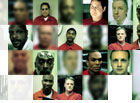|
IRAN - The CommanderŌĆÖs Daughter: How a Viral Photo Exposed IranŌĆÖs Elite Hypocrisy
November 21, 2025: November 21, 2025 - IRAN. The Commander’s Daughter: How a Viral Photo Exposed Iran’s Elite Hypocrisy
The LinkedIn profile appeared unremarkable at first glance.
A psychologist in an Australian coastal town, smiling without a headscarf, described her counseling practice and posted feminist commentary about work–life balance.
But when social media users identified the woman as Hanieh Safavi, the youngest daughter of one of Iran’s most hardline military commanders, the image detonated across Persian-language networks.
Within hours, her profile vanished. The damage, however, was done.
The photograph and accompanying details thrust the spotlight onto the family of Major General Yahya Rahim Safavi, former commander of the Islamic Revolutionary Guard Corps (IRGC) and senior advisor to Supreme Leader Ali Khamenei.
For decades, Rahim Safavi has championed the Islamic Republic’s most repressive policies, including mandatory hijab laws that have seen thousands of Iranian women arrested, beaten, and imprisoned.
Now his own daughter lives openly in the West, her head uncovered, running a private psychology practice 12,847 kilometers from Tehran’s morality police.
The contradiction has crystallized long-simmering anger among Iranians, who see a ruling class that enforces strict Islamic law at home while their children enjoy Western freedoms abroad.
That resentment has only intensified as the regime cracks down on dissent following the 2022 protests sparked by Mahsa Amini’s death in custody for allegedly wearing her hijab improperly.
The Safavi family has remained silent. Both Hanieh’s LinkedIn profile and Instagram account have been deleted. But the damage to her father’s cultivated image as an ideological hardliner was already done.
Rahim Safavi, now 73, represents the IRGC’s old guard. Born in 1952, he earned a bachelor’s degree in geology in 1975 but found his calling in revolutionary politics during his student years in Tabriz.
When the 1979 revolution swept Iran, he was active in Isfahan, organizing revolutionary forces in the uprising’s first days.
He rose rapidly through the newly formed Revolutionary Guard’s ranks during the Iran-Iraq war, serving as deputy commander of ground forces from 1986 to 1988, then as commander in chief.
His ascent to real power came when he became the IRGC’s fifth overall commander - the first person directly appointed to the position by Supreme Leader Ali Khamenei.
The appointment marked him as one of the most important figures in shaping the Islamic Republic’s military and political structure.
Military training in Lebanon, participation in armed conflicts in Isfahan and Kurdistan, and absolute loyalty to the Supreme Leader transformed Rahim Safavi into a hardline, security-oriented figure.
His rhetoric has been characteristically brutal. He once called the press “poisonous snakes.”
He threatened opponents with the phrase, “We must behead some and cut out the tongues of others,” effectively promising death for those who crossed him.
During protests on July 9, 1999, Rahim Safavi personally ordered IRGC forces to intervene for suppression. He later recalled the crackdown with pride.
Under his command, the IRGC became more than ever a tool of social and political control.
After his 10-year tenure ended, he was appointed senior advisor to the Supreme Leader, taking on an increasingly ideological role in defending the Supreme Leader and the Islamic Republic’s security discourse.
Rahim Safavi remains one of the Islamic Republic’s most vocal theoretical and practical defenders.
His approach systematically redefines dissent. By labeling opponents as “power-hungry,” “hypocrites,” “subversive,” and even “irreligious,” he turns all civil protest into enmity against the system.
Operating under a logic of “friendship or enmity with the leadership,” he erases the boundary between criticism and treason.
Emphasizing unity around the Supreme Leader while warning about “future seditions,” Rahim Safavi reduces politics to a scene of obedience and security vigilance.
His framework takes for granted the legitimacy of forceful confrontation with protesters.
This is the ideological world that shaped his family, and the worldview his youngest daughter appears to have escaped.
Details about Hanieh Safavi remain scarce. According to her deleted LinkedIn profile, she lives in Townsville, Australia, where she established a counseling and psychology center in 2020.
The small coastal city, far from major Iranian diaspora communities, seems an unlikely home for an IRGC commander’s daughter.
Before the recent controversy, there was little information about Hanieh on the internet or in Iranian media.
The Safavi daughters have maintained notably low profiles compared to their brother.
Hanieh is not the first Safavi daughter to spark controversy. Her older sister, Hannaneh Sadat Safavi, became entangled in Iran’s “illegal scholarships” affair in the early 2010s.
In November 2014, Mohammad Ali Najafi, then head of the Ministry of Science, Research and Technology, announced that 2,000 people had used illegal scholarships.
Only 36 were expelled. Among those who received improper government funding was the commander’s daughter - someone for whom hundreds of thousands of dollars had been spent from the public budget.
Hannaneh continued her doctoral studies in cultural sociology at Allameh Tabatabai University in the late 2010s, focusing her research on gender issues.
In her published work, she argued that Islamic countries should not be measured by Western standards because doing so contradicts their values.
She described Islamic and Western development as fundamentally different. Western development, she wrote, means “providing life welfare and meeting material needs,” while Islamic development aims to “flourish human talents and comprehensive growth.”
In 2011, Hannaneh co-authored an article with Mohammad Aghasi, then a philosophy of social sciences student at Baqer al-Oloom University, examining factors that attracted students to the Man-o-To opposition TV channel.
Aghasi is now Hannaneh’s husband and the commander’s son-in-law. His name also appeared on the list of illegal scholarships.
Today, he is a faculty member in the sociology department at Kharazmi University and director general of the Office of Media Studies and Planning, playing an influential role in many official polling projects in Iran.
He describes hijab not just as a social norm but as something “sacred” with “religious and social necessity.”
He positions hijab as a sign of faith, chastity, and the moral health of society, adding that this value should be internalized and institutionalized through families, educational systems, and cultural institutions.
A scholar who writes academic papers defending mandatory hijab is married to a woman whose younger sister lives openly in Australia without a headscarf, while Rahim Safavi commands forces that have violently enforced hijab laws.
The book “Companion,” based on conversations and memoirs of Mehrshad Shababi, Rahim Safavi’s wife, offers an ideological picture of family life among the IRGC elite.
Shababi’s narrative shows the family operating not as a conventional household but as part of the Islamic Republic’s revolutionary and military project.
She repeatedly references her role in IRGC missions, women’s education, and cultural activities while describing the responsibility of raising three children during wartime - children under bombardment and insecurity, with a mother who traveled between home and the front.
The portrait is one of sacrifice for ideology. Yet the trajectory of the children suggests a more complicated reality.
The Rahim Safavi family has leveraged academic credentials and research institutions to advance the Islamic Republic’s ideology while securing privileged positions.
In their hands, the humanities have become tools not for critiquing power but platforms for reproducing political legitimacy.
The commander’s brother, Mohsen Safavi Hamami, founded and leads the Islamic Research and Information Center (IRIC) in Washington, D.C.
Although the center presents itself as a non-governmental and academic institution, it operates within the framework of promoting and representing the Islamic Republic’s official discourse in the West.
IRIC has held consultative status with the U.N. Economic and Social Council since 2015.
Another family member has recently drawn attention: Hamzeh Rahim Safavi, the commander’s son.
Like his uncle, he runs a research institute - the Institute of Future Studies of the Islamic World, which defines its mission as “strengthening the convergence and unity of Islamic countries.”
The institute uses academic language and concepts like “one ummah,” “global Islamic power bloc,” and “Islamic internationalism” to promote a form of religious internationalism that positions the Islamic Republic as the axis of the Islamic world.
Though its official statements emphasize “realism” and “pragmatism,” most content on its website is propaganda and ideology.
Yet Hamzeh has recently attempted to present himself as a critical voice within the system, offering a different perspective on foreign policy and Iran’s security strategy.
In a context where many independent critics face arrest and security pressure for far more cautious statements, he has openly criticized Tehran’s growing dependence on Moscow.
Following the 12-day war with Israel, he mocked Russian military support, “Russia had one S-300 that didn’t even make one successful shot. We don’t put our necks under Russia’s cleaver.”
The statement targeted both the failure of Russian technology and the Islamic Republic’s policy of over-reliance on its Eastern axis.
He has said Iran’s relations with Russia and China suffer from “structural distrust” and that these countries consider Iran an “unreliable partner” - an interpretation contradicting the official narrative of a “strategic Eastern-oriented alliance.”
Hamzeh’s most pointed criticism emerged from his account of a confidential meeting at the Ministry of Foreign Affairs during the Ebrahim Raisi administration.
He recalled the head of the advisory group to the foreign minister saying, “Global powers have disappeared and Iran is the only superpower in the world.”
“Interestingly, no one laughed,” Hamzeh said with sarcasm.
In media interviews, he has described the outcome of “the first half of the Iran–Israel war” as “three to one in favor of Israel,” and raised the possibility of the assassination of senior Islamic Republic officials in the next war.
https://iranwire.com/en/features/146452-the-commanders-daughter-how-a-viral-photo-exposed-irans-elite-hypocrisy/ (Source: Iranwire)
|

